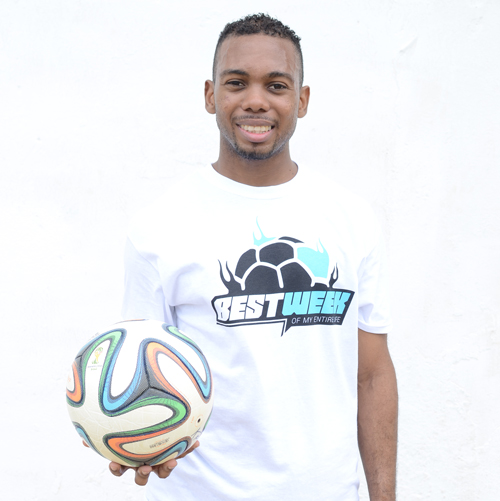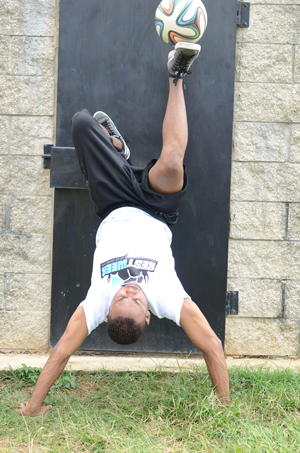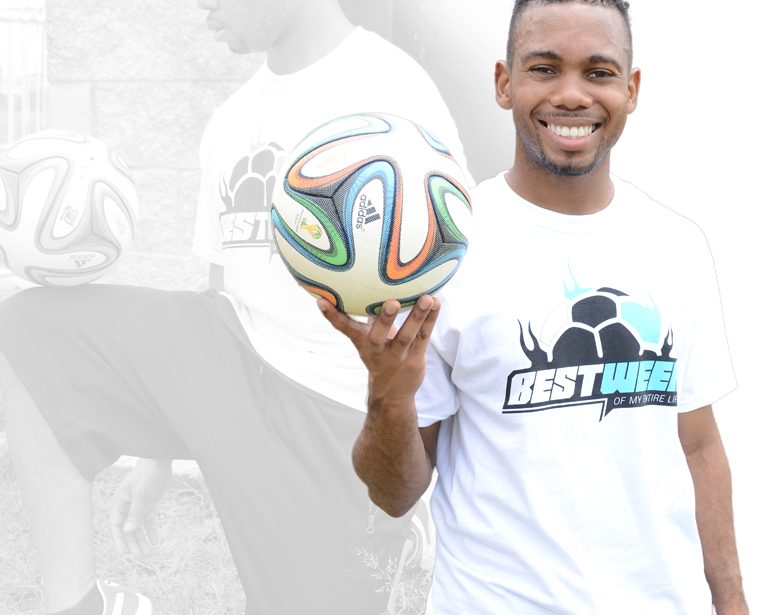“All you need is a ball and your imagination.”
As cliché as it may sound, this is Kerron Ford’s reality.
Kerron is Trinidad and Tobago’s six-time national champion in freestyle football.
He is among only a handful of competitive players in the country practicing the sport, and has competed and/or performed in over 13 countries throughout the world including Argentina, Brazil, South Africa, Czech Republic and England. He is the current Caribbean champion, and is ranked top 16 in North America, Central America and the Caribbean; and 47th in the world.
To date, his accolades include:
No barriers, no rules — just skills- Guinness Skills Challenge Caribbean Championship Champion 2014
- Guinness Skills Challenge Champion 2014
- Guinness Skills Challenge Caribbean Championship Runner Up 2013
- Guinness Skills Challenge Champion 2013
- B-Mobile Bragging Rights Champion 2011
- Redbull Street Style Champion 2009
- Redbull Street Style Champion 2008
- Redbull Reaccion Champion 2007
“Anyone can be a champion at this sport once you put your mind to it,” he says. “The great thing about freestyle football is that there are no barriers, no rules — just skills.”
Going Freestyle
As a teenager, Kerron played various other sports including basketball, hockey, volleyball and swimming; but it was football that finally superseded the others after he began trying out freestyle ‘tricks’ in 2007 at the age of 16.
He began trying out freestyle ‘tricks’“I started it with a few of my friends, as a way to increase my football skills on the pitch,” he says.
“Then, six months into my training, Red Bull held the first local national qualifier to crown the best in the country, who would then fly to Argentina to represent the country in the regional championships — and the rest is history.”

It was in Argentina that Kerron first saw the level of the athletes in the sport, and realised that freestyle football was what he wanted to do for a living.
As a professional in the sport, he acknowledges that there are three different dimensions to his career — (1) as a competitive athlete, advancing his own skills with his training (2) as a coach, training others to develop their skills in the sport, and (3) the entertainment aspect of performing tricks for an audience.
I can’t say it enough: the most important thing is practice“To juggle all of these, I can’t say it enough: the most important thing is practice,” he notes. “And also, being able to fully dedicate your time and have that determination to succeed.”
He acknowledges that he would not have made it to where he is today without the help of Mr. Eddie Hart, who continuously encouraged and supported him while he practiced daily at the Eddie Hart grounds; and his sponsors Xtra Foods Supermarket and The Ministry of Sport, his main sponsor for the past three years.
The reality, as he explains, is that there are few competitions, and it is difficult for someone to balance the athletic demands of freestyle football with a full-time job, as being a freestyle footballer requires spending several hours every day training to perfect a trick.
“While many may love the sport, few will really dedicate their time and stick to it to make it into a career,” he laments. “I’ve met many talented local freestylers who give up before they can really make it big.”
The Art of Freestyle Football
The general public may think of it as ‘tricks’ using the entire body, but ‘freestyle football’ is best described as the art of self expression with a football. It is practiced both within the sport of football and as a sport in its own right.
The art of self expression with a footballThe origins of freestyle football can be traced back throughout the centuries to circus performers, but its true emergence as the sport it is known as today began in the twentieth century.
Argentenian footballer Diego Maradona was one of the first to demonstrate ‘freestyle’ moves on a global stage, which led others to imitate tricks and pushed the development of the sport. Other well-known names in the early days of the sport’s existence are South Koreans Hee Young Woo (Mr. Woo) and Kang Sung Min.
Global giant Nike pushed freestyle football even more into the public arena with its “Joga Bonito” (“Beautiful Game”) campaign featuring Mr. Woo, Brazilian icon Ronaldinho, Cristiano Ronaldo and Edgar Davids.
Today, freestyle football has gained prominence around the world, particularly in South America, with countries such as Colombia, Brazil, Argentina, Venezuela and Chile forming freestyle crews of dozens or even hundreds of freestylers.
It is still however, a relatively new sport, with its first major international competition, Red Bull Street Style, being held in Brazil less than a decade ago in 2008.
Nevertheless, with the rise of social media platforms such as YouTube and Facebook, the art form continues to rise in popularity and evolve globally.
Inspiration through Freestyle Football
Kerron continues to build upon his own skill set daily, and like many other freestylers, he has created his own signature moves.
He trains in open areas, which helps him to ward against stage fright when he performs; and he also uses music to help him in keeping focus. The Japanese freestylers are his favourite in the sport; they integrate break-dancing and musicality (playing to a beat) into the sport.
It is a patience sport
“There’s just so much you can do — literally, anything you can think of. Freestyle football is really just taking it to another level with your skills,” he adds. “But it is a patience sport; your body will get used to the repetition and fine muscle movements, but it is more mental training than anything else.”
One of his proudest moments was his first international gig, performing at the First Division League Games in England with an audience of over 60,000 people. It was a revelatory moment which demonstrated the potential of the sport to impact others.
Beyond nurturing his own three-dimensional career in the sport as athlete, coach and performer, he also sees the need for the sport to be promoted as an inspirational tool for others, and an outlet that can help youths rise above negative influences in society such as crime and drugs.
He has attended several high schools around the world in the capacity of a motivational speaker, and has also done charity work at local prisons.
‘You just changed my life’“When I finished my performance at YTC (Youth Training Centre Prison for boys under 18), a guy came up to me and said: ‘You just changed my life’,” he reminisces.
“Just by me being there, an ordinary guy with a dream and the determination to do something big, it showed him that he could be something too.”

